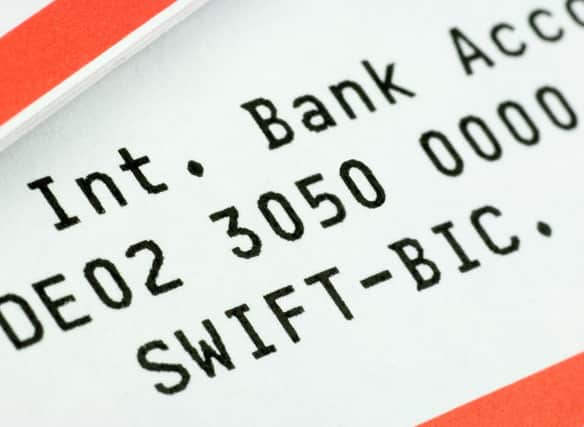What is Swift? Why Russia needs Swift, what SWIFT means - and will Swift be part of Russian sanctions?


As the UK, US and EU continue to brandish more sanctions on Russia as it continues to attack Ukraine by air, land and sea, one of the sanctions still being considered and urged by Ukraine and some Western leaders, including First Minister Nicola Sturgeon, is to remove Russia’s access to the SWIFT system.
SWIFT is the messaging system used by thousands of banks and financial systems worldwide to communicate and is used by Russia to trade with international partners.
Advertisement
Hide AdAdvertisement
Hide AdOn Thursday (February 24) UK Prime Minister Boris Johnson outlined that as part of its “relentless mission to squeeze Russia from the global economy”, proposals to cut Russia off from SWIFT are “not off the table”.
Deputy Prime Minister of Latvia Artis Pabriks meanwhile criticised the reluctance of Germany and European Union allies to cutting off Russia’s Swift access on Friday (February 25).
“Some people in Europe are afraid of losing money while other people in Kyiv have to die," Mr Pabriks told the BBC’s Victoria Derbyshire.
But what is SWIFT – and why hasn’t it been used in sanctions on Russia yet?
Here’s what you need to know.
What is Swift and what does SWIFT stand for?
SWIFT is the name given to an international messaging system that transmits information used for payment transactions across borders and banks across the globe.
The acronym stands for the Society of Worldwide Interbank Financial Telecommunication.
Swift, based in Belgium, is a cooperative of approximately 11,000 financial institutions across the world such as banks, asset managers, dealers of securities and exchanges.
It provides a secure network through which messages can be sent between these across different banks and countries, to allow transactions and payments to take place using its standardised code system.
Advertisement
Hide AdAdvertisement
Hide AdA unique Swift code, also known and seen more commonly in the UK as a Bank Identifier Code (BIC), is assigned to every different financial institution.
The code is either eight or 11 characters in length and can usually be found on bank statements or wherever you get your account information.
When a transaction or payment is made, a payment transfer SWIFT message will first be sent from the financial institution of the sender to that of the receiver across SWIFT’s secure network – with the payment only going through once the SWIFT message has been received.
2021 saw SWIFT record an average of 42 million of its messages per day, with traffic growing 11.4% more on the same period in 2020.
Why does Russia need SWIFT?
As with countries worldwide, Russian banks and financial institutions rely on SWIFT to do business with and receive payments from the global community.
Russia is one of the world’s largest providers of oil and gas, so it relies upon mechanisms like SWIFT to receive funds for its commodity sales worldwide.
And because of this, cutting Russia off from the payment network has been considered one of the toughest ways to weaken Russia in response to its attacks on Ukraine.
Russia has its own alternative to SWIFT in the form of its System for Transfer of Financial Messages, which it introduced in 2014 after its annexation of Crimea saw the threat of SWIFT revocation first rear its head.
Advertisement
Hide AdAdvertisement
Hide AdBut Russia’s system is largely used within Russia itself, meaning it could turn to cryptocurrency or other alternatives should SWIFT form a part of sanctions.
Will Swift be used in Russian sanctions?
There are number of world leaders pushing for Russia’s access to the Swift payment system to be revoked as part of sanctions on the country following its attack on Ukraine.
Ukrainian President Volodymyr Zelenskyy is among them, tweeting on Thursday afternoon to reinforce his ask that allies commit to the hardest-hitting sanctions on the country – including disconnecting Russia from Swift.
"A package of additional tough sanctions against Russia from the EU is approaching,” Mr Zelenskyy wrote on Twitter.
"Discussed all the details with @EmmanuelMacron.
“We demand the disconnection of Russia from SWIFT, the introduction of a no-fly zone over Ukraine and other effective steps to stop the aggressor.
Boris Johnson likewise told MPs in Westminster on Thursday evening that Swift could remain part of considerations of further sanctions on Russia.
“I know that this house will have great interest in the potential of cutting Russia out from Swift, and I can confirm as I've always said that nothing is off the table,” Mr Johnson said.
Dmytro Kuleba Ukranian Minister of Foreign Affairs is among a number of European leaders calling on the EU to revoke Russia’s access to the payment system.
Advertisement
Hide AdAdvertisement
Hide Ad"I will not be diplomatic on this,” said Mr Kuleba in a tweet on Thursday afternoon.
"Everyone who now doubts whether Russia should be banned from SWIFT has to understand that the blood of innocent Ukrainian men, women and children will be on their hands too.
"BAN RUSSIA FROM SWIFT.”
But German Chancellor Olaf Scholz suggested on Thursday that he was against SWIFT being used in Russian sanctions, telling EU leaders that “it’s very important that we decide on measures that have been prepared in recent weeks and reserve everything else for a situation where it is necessary to do other things as well”.
In response, Nicola Sturgeon tweeted on Friday: "If the current situation doesn’t make the maximum possible sanctions - including exclusion from SWIFT - necessary and urgent, it’s hard to imagine what would.
"This is not a time for half measures.
"#StandWithUkraine”
A message from the Editor:
Thank you for reading this article. We're more reliant on your support than ever as the shift in consumer habits brought about by coronavirus impacts our advertisers.
If you haven't already, please consider supporting our trusted, fact-checked journalism by taking out a digital subscription.
Comments
Want to join the conversation? Please or to comment on this article.
